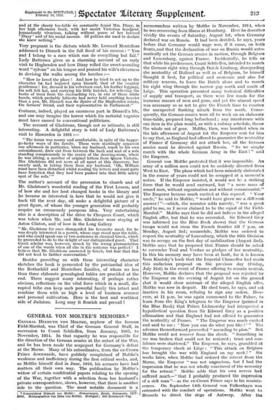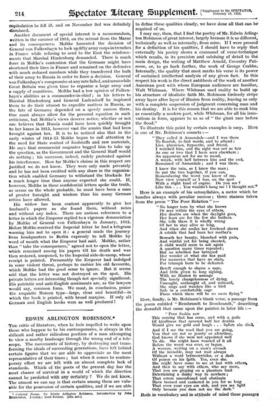GENERAL VON MOLTKE'S MEMOIRS.* GENERAL HELMUTH VON MOLTKE, nephew of
the famous Pled-Marshal, was Chief of the German General Staff, in succession to Count Schlieffen, from January, 1905, to November, 1914. In that capacity he was responsible for the direction of the German armies at the outset of the War, and he has been made the scapegoat for Germany's defeat at the Marne. Many of his subordinates, from the ex-Crown Prince downwards, have publicly complained of Moltke's weakness and inefficiency during the first critical weeks, and, as Moltke himself died in June, 1916, his accusers have had matters all their own way. The publication by Moltke's widow of certain confidential papers relating to the opening of the War, together with a selection from her husband's private correspondence, shows, however, that there is another Side to the question. The most notable document is a t • Q enoralobent Hobnails son Moltke : Ersnnerunoen, Briefo, Doan: wale, 1877- 3.518, Hekausgenetren von Flint von Moltke, Stuttgart : Der Kommende Tag.
memorandum written by Moltke in November, 1914, when he was recovering from illness at Homburg. Here he describes vividly the events of Saturday, August 1st, when Germany declared war on Russia. It had been decided, he says, years before that Germany would wage war, if it came, on both fronts, and that the declaration of war on Russia would auto- matically set the German armies in motion, through Belgium and Luxemburg, against France. Incidentally, he tells us that while his predecessor, Count Schlieffen, intended to march the German right wing through Dutch Limburg, disregarding the neutrality of Holland as well as of Belgium, he himself thought it best, for political and economic and also for military reasons, to leave the Dutch alone and to march his right wing through the narrow gap north and south of Liege. This operation presented many technical difficulties of supply and transport, as there were few roads for the immense masses of men and guns, and yet the utmost speed was necessary so as not to give the French time to counter the unexpected flanking attack from the north. Conse- quently, the German armies were all to work on an elaborate time-table, prepared long beforehand ; any interference with one item in the plan would, as with a railway schedule, throw the whole out of gear. Moltke, then, was horrified when in the late afternoon of August 1st the Emperor sent for him to say that, as England had offered to guarantee the neutrality of France if Germany did not attack her, all the German armies must be directed against Russia. " So we simply march with the whole German Army in the East 1 " said the Emperor.
General von Moltke protested that it was impossible. An army of a million men could not be suddenly diverted from West to East. The plans which had been minutely elaborated in the course of years could not be scrapped at a moment's notice. If the Emperor insisted, it would not be a striking force that he would send eastward, but " a mere mass of armed men, without organization and without commissariat." The Emperor became much excited at this reproof. " Your uncle," he said to Moltke, " would have given me a different answer 1 "--which, the narrator adds naively, " was a great grief to me, as I never claimed to be the equal of the Field- Marshal." Moltke says that he did not believe in the alleged English offer, but that he was overruled. Sir Edward Grey was informed (as the Blue Book shows) that the German troops would not cross the French frontier till 7 p.m. on Monday, August 3rd; meanwhile, Moltke was ordered to respect the neutrality of Luxemburg, which the 16th Division was to occupy on the first day of mobilization (August 2nd). Moltke says that he proposed that France should be asked to surrender Toni and Verdun as pledges of her neutrality. In this his memory may have been at fault, for it is known from Kautsky's book that the Imperial Chancellor had made this audacious proposal on the previous day (Friday, July 31st) in the event of France offering to remain neutral. However, Moltke declares that the proposal was rejected by the Emperor on the evening of August 1st on the ground that it would show mistrust of the alleged English offer. Moltke was now in despair. He shed tears, lie says, and sat inactive in his room, refusing to sign any orders. How- ever, at 11 p.m. he was again summoned to the Palace, to learn from the King's telegram to the Emperor (printed in the Blue Book) that Prince Lichnowsky had interpreted is hypothetical question from Sir Edward Grey as a positive affirmation and that England had not offered to guarantee the neutrality of France. " The Emperor was much excited and said to me : ' Now you can do what you like ! ' " The advance thenceforward proceeded " according to plan." But Moltke could not recover from the shock. " Something in me was broken that could not be restored ; trust and con- fidence were shattered." The Emperor, he says, grumbled at the temporary check at Liege " This attack on Belgium has brought the war with England on my neck f " Six weeks later, when Moltke had ordered the retreat from the Marne, the Emperor " was not ungracious, but I had the impression that he was not wholly convinced of the necessity for the retreat." Moltke adds that his own nerves had suffered much—" that I probably produced the impression of a sick man "—as the ex-Crown Prince says in his reminis- cences. On September 14th General von Falkenhayn was entrusted with the conduct of operations. Moltke went to Brussels to direct the siege. of Antwerp. After the
capitulation he fell ill, and on November 3rd was definitely dismissed.
Another document of special interest is a memorandum, written in the summer of 1915, on the retreat from the Marne
and its consequences. Moltke lamented the decision of General von Falkenhayn to lock up fifty army corps in trenches in France while refusing to send to the East the reinforce- ments that Marshal Hindenburg demanded. There is much force in Moltke's contention that the Germans might have shortened their lines in France and remained on the defensive with much reduced numbers while they transferred the bulk of their army to Russia in order to force a decision. General von Falkenhayn's compromise at any rate failed, and meanwhile Great Britain was given time to organize a large army and a supply of munitions. Moltke had a low opinion of Falken- hayn's abilities as a commander-in-chief ; in his letters to Marshal Hindenburg and General Ludendorff he implored them to do their utmost to expedite matters in Russia, as the fate of Germany depended on a speedy success there. One must always allow for the personal equation in such criticisms, but Moltke's views deserve notice, whether or not one believes that Russia could have been quickly brought to her knees in 1915, however vast the armies that had been brought against her. It is to be noticed also that in the early winter of 1914-15 Moltke began to call attention to the need for State control of foodstuffs and raw materials, He says that commercial magnates begged him to take up the question, as the Government and the General Staff would do nothing ; his successor, indeed, rudely protested against his interference. How far Moltke's claims in this respect are justified we do not know. They were only made privately and he has not been credited with any share in the organiza- tion which enabled Germany to withstand the blockade for a much longer time than anyone expected she could. If, however, Moltke in these confidential letters spoke the truth, as seems on the whole probable, he must have been a man of greater foresight and wisdom than his many German critics have allowed.
His widow has been content apparently to give her husband's papers as she found them, without notes and without any index. There are curious references to a letter in which the Emperor replied to a vigorous denunciation by Moltke of General von Falkenhayn in January, 1915. Before Moltke received the Imperial letter he had a telegram warning him not to open it : a general made the journey from headquarters to Berlin expressly to tell Moltke by word of mouth what the Emperor had said. Moltke, rather than " take the consequences," agreed not to open the letter, which remained among his papers till his death and was then restored, unopened, to the Imperial aide-de-camp, whose receipt is printed. Presumably the Emperor had indulged in some violent threat, perhaps to cashier his old favourite, which Moltke had the good sense to ignore. But it seems odd that the letter was not destroyed on the spot. His private letters are interesting though not specially significant. His patriotic and anti-English sentiments are, as the lawyers would say, common form. We must, in conclusion, praise the exquisite Roman type—large, clear and beautiful—in which the book is printed, with broad margins. If only all German and English books were as well produced I



































































 Previous page
Previous page